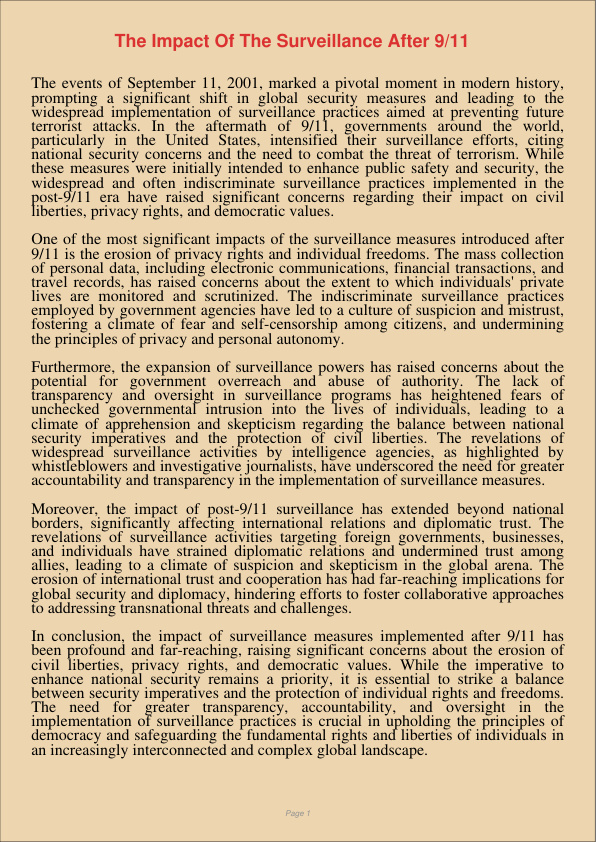The Impact Of The Surveillance After 911
Jan 9, 2024
surveillance
impact
Management
Engineering and Construction
The events of September 11, 2001, marked a pivotal moment in modern history, prompting a significant shift in global security measures and leading to the widespread implementation of surveillance practices aimed at preventing future terrorist attacks. In the aftermath of 9/11, governments around the world, particularly in the United States, intensified their surveillance efforts, citing national security concerns and the need to combat the threat of terrorism. While these measures were initially intended to enhance public safety and security, the widespread and often indiscriminate surveillance practices implemented in the post-9/11 era have raised significant concerns regarding their impact on civil liberties, privacy rights, and democratic values.
One of the most significant impacts of the surveillance measures introduced after 9/11 is the erosion of privacy rights and individual freedoms. The mass collection of personal data, including electronic communications, financial transactions, and travel records, has raised concerns about the extent to which individuals’ private lives are monitored and scrutinized. The indiscriminate surveillance practices employed by government agencies have led to a culture of suspicion and mistrust, fostering a climate of fear and self-censorship among citizens, and undermining the principles of privacy and personal autonomy.
Furthermore, the expansion of surveillance powers has raised concerns about the potential for government overreach and abuse of authority. The lack of transparency and oversight in surveillance programs has heightened fears of unchecked governmental intrusion into the lives of individuals, leading to a climate of apprehension and skepticism regarding the balance between national security imperatives and the protection of civil liberties. The revelations of widespread surveillance activities by intelligence agencies, as highlighted by whistleblowers and investigative journalists, have underscored the need for greater accountability and transparency in the implementation of surveillance measures.
Moreover, the impact of post-9/11 surveillance has extended beyond national borders, significantly affecting international relations and diplomatic trust. The revelations of surveillance activities targeting foreign governments, businesses, and individuals have strained diplomatic relations and undermined trust among allies, leading to a climate of suspicion and skepticism in the global arena. The erosion of international trust and cooperation has had far-reaching implications for global security and diplomacy, hindering efforts to foster collaborative approaches to addressing transnational threats and challenges.
In conclusion, the impact of surveillance measures implemented after 9/11 has been profound and far-reaching, raising significant concerns about the erosion of civil liberties, privacy rights, and democratic values. While the imperative to enhance national security remains a priority, it is essential to strike a balance between security imperatives and the protection of individual rights and freedoms. The need for greater transparency, accountability, and oversight in the implementation of surveillance practices is crucial in upholding the principles of democracy and safeguarding the fundamental rights and liberties of individuals in an increasingly interconnected and complex global landscape.
